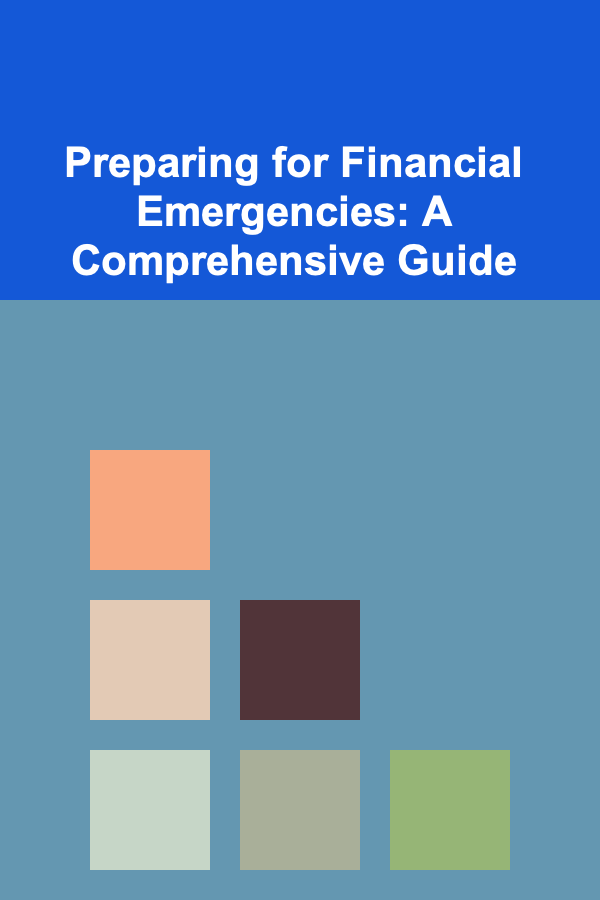
Preparing for Financial Emergencies: A Comprehensive Guide
ebook include PDF & Audio bundle (Micro Guide)
$12.99$6.99
Limited Time Offer! Order within the next:

Understanding Financial Emergencies
Life is inherently unpredictable. While we strive for stability and plan for the future, unforeseen events can disrupt our carefully laid plans, often with significant financial consequences. A financial emergency is any sudden, unexpected event that requires immediate expenditure of funds, potentially exceeding one's regular income and savings. These emergencies can range from relatively minor inconveniences to catastrophic life-altering events.
Understanding the potential scope and nature of financial emergencies is the first crucial step in preparing for them. This isn't about predicting the future, but about acknowledging the inherent risks and proactively building a financial safety net.
Common Examples of Financial Emergencies
- Medical Emergencies: This is arguably the most significant and potentially devastating financial emergency. Unexpected illnesses, accidents, or injuries can lead to substantial medical bills, including hospital stays, surgeries, medications, and rehabilitation. Even with health insurance, deductibles, co-pays, and uncovered services can quickly drain savings. The loss of income during recovery can further compound the problem.
- Job Loss: Regardless of your industry or experience level, job loss is a possibility. Company downsizing, economic downturns, or performance issues can all lead to unemployment. The sudden cessation of income can create immediate pressure to cover essential expenses like rent/mortgage, utilities, food, and transportation. The length of unemployment is often uncertain, making this a particularly stressful financial emergency.
- Home Repairs: Owning a home comes with inherent responsibilities and the risk of unexpected repairs. A burst pipe, a leaky roof, a malfunctioning HVAC system, or foundation issues can all require immediate and costly repairs. Ignoring these problems can lead to further damage and even higher expenses down the line. Homeowners insurance may cover some types of damage, but often with a deductible and specific coverage limitations.
- Car Repairs: For many, a car is essential for commuting to work, running errands, and transporting family members. Unexpected car repairs, such as engine trouble, transmission failure, or damage from an accident, can be a significant financial burden. Even if the car is insured, the deductible and potential increase in insurance premiums can still strain finances.
- Natural Disasters: Hurricanes, floods, earthquakes, wildfires, and other natural disasters can cause widespread damage to homes and property. Recovery efforts can be expensive and time-consuming, requiring significant financial resources for repairs, temporary housing, and replacing lost belongings. While insurance may cover some losses, it rarely covers everything, and the claims process can be lengthy.
- Legal Issues: Unexpected legal problems, such as lawsuits, traffic violations, or other legal disputes, can incur significant legal fees. Hiring a lawyer, court costs, and potential settlements or fines can quickly deplete savings.
- Family Emergencies: Unexpected needs of family members, such as helping an aging parent with medical expenses, assisting a child with unexpected college costs, or providing support to a relative facing hardship, can create financial strain. These situations often involve emotional considerations, making it difficult to prioritize financial needs.
These are just a few examples of the many potential financial emergencies that can arise. The specific emergencies that you are most likely to face will depend on your individual circumstances, such as your age, health, occupation, location, and family situation.
Why Preparation is Crucial
Failing to prepare for financial emergencies can have severe consequences. Without a financial safety net, individuals and families may be forced to:
- Accumulate Debt: Relying on credit cards or high-interest loans to cover emergency expenses can quickly lead to a cycle of debt. Interest charges can add significantly to the overall cost of the emergency, making it even harder to recover financially.
- Deplete Retirement Savings: Withdrawing funds from retirement accounts to cover emergencies can have long-term consequences, including reduced retirement income and potential penalties.
- Sacrifice Essential Needs: In desperate situations, individuals may be forced to cut back on essential needs, such as food, housing, or healthcare, to cover emergency expenses.
- Damage Credit Score: Missed payments or defaults on loans can negatively impact credit scores, making it more difficult to obtain credit in the future.
- Experience Increased Stress and Anxiety: Financial stress can have a significant impact on mental and physical health, leading to anxiety, depression, and other health problems.
By proactively preparing for financial emergencies, you can mitigate these risks and protect your financial well-being. Preparation provides a sense of security and allows you to navigate unexpected challenges with greater confidence.
Building an Emergency Fund: The Foundation of Financial Security
The cornerstone of financial emergency preparedness is a robust emergency fund. An emergency fund is a dedicated savings account specifically earmarked for covering unexpected expenses. It acts as a buffer between you and financial ruin when life throws you a curveball.
How Much Should You Save?
The commonly recommended rule of thumb is to save 3-6 months' worth of essential living expenses in your emergency fund. This means calculating your monthly expenses for necessities like rent/mortgage, utilities, food, transportation, insurance premiums, and essential debt payments. Then, multiply that figure by 3 to arrive at the lower end of the recommended range, and by 6 to arrive at the upper end.
However, the ideal amount for your emergency fund depends on your individual circumstances:
- Job Security: If you work in a stable industry and have a secure job, you may be comfortable with the lower end of the range (3 months). If you work in a volatile industry or have concerns about job security, you should aim for the higher end of the range (6 months or more).
- Income Stability: If you have a consistent and predictable income, you may be able to get by with a smaller emergency fund. If your income is variable or fluctuates significantly (e.g., if you are self-employed or work on commission), you will need a larger emergency fund to cushion against income shortfalls.
- Health Status: If you have chronic health conditions or a family history of illness, you may need a larger emergency fund to cover potential medical expenses.
- Dependents: If you have dependents, such as children or elderly parents, you will need a larger emergency fund to cover their needs in case of an emergency.
- Insurance Coverage: While insurance is critical, deductibles and coverage limits mean you'll likely need liquid funds readily available. Review your policies (health, auto, home) and understand your potential out-of-pocket costs.
Consider these factors carefully when determining the appropriate size of your emergency fund. It's always better to err on the side of caution and save more than you think you need.
Where to Keep Your Emergency Fund
The ideal place to keep your emergency fund is in a high-yield savings account (HYSA) at a reputable bank or credit union. A HYSA offers a higher interest rate than a traditional savings account, allowing your money to grow faster while remaining easily accessible.
Key considerations when choosing a HYSA:
- Interest Rate: Compare interest rates from different banks and credit unions to find the best rate available. Keep in mind that interest rates can fluctuate, so it's important to stay informed.
- FDIC Insurance: Ensure that the bank or credit union is insured by the Federal Deposit Insurance Corporation (FDIC) or the National Credit Union Administration (NCUA). This protects your deposits up to $250,000 per depositor, per insured institution.
- Accessibility: Choose an account that allows you to easily access your funds when needed. Most HYSAs offer online and mobile banking, as well as debit cards or check-writing privileges.
- Fees: Be aware of any fees associated with the account, such as monthly maintenance fees, transaction fees, or early withdrawal penalties. Look for accounts with minimal or no fees.
Avoid investing your emergency fund in volatile investments like stocks or bonds. The goal is to preserve capital and have readily available funds when needed, not to generate high returns. The potential for loss in the stock market outweighs the potential gains when it comes to emergency savings.
Strategies for Building Your Emergency Fund
Building an emergency fund can seem daunting, especially if you are starting from scratch. Here are some strategies to help you reach your savings goal:
- Set a Budget: Creating a budget is the first step in identifying areas where you can cut expenses and free up money for savings. Track your income and expenses for a month or two to get a clear picture of your spending habits. Then, identify non-essential expenses that you can reduce or eliminate.
- Automate Savings: Set up automatic transfers from your checking account to your emergency fund each month. Even small, regular contributions can add up over time. Treat it like any other bill payment.
- Find Extra Income: Explore opportunities to earn extra income, such as freelancing, part-time work, or selling unwanted items. Direct all extra income towards your emergency fund.
- Reduce Expenses: Look for areas where you can cut back on spending. Can you negotiate better rates on your insurance policies? Can you reduce your grocery bill by meal planning and using coupons? Every dollar saved is a dollar that can be put towards your emergency fund.
- Use Windfalls Wisely: When you receive a bonus, tax refund, or other windfall, resist the temptation to splurge. Instead, allocate a portion of the money to your emergency fund.
- Start Small: Don't get discouraged if you can't save a large amount of money right away. Start with small, achievable goals and gradually increase your savings over time. Even saving $25 or $50 per month is a step in the right direction.
- Make it a Priority: Treat your emergency fund as a non-negotiable expense. Make it a priority to save for it each month, even when faced with competing demands.
Building an emergency fund takes time and discipline, but the peace of mind it provides is well worth the effort. Once you have reached your target savings goal, resist the temptation to use the funds for non-emergency purposes. Replenish the fund as soon as possible after any withdrawals.
Beyond the Emergency Fund: Diversifying Your Financial Preparedness
While an emergency fund is the cornerstone of financial security, it's just one piece of the puzzle. A comprehensive approach to financial emergency preparedness involves diversifying your strategies and considering other important factors.
Insurance Coverage: Protecting Against Major Losses
Insurance is an essential tool for protecting yourself against major financial losses resulting from unexpected events. Review your insurance coverage regularly to ensure that you have adequate protection in place.
- Health Insurance: Maintain adequate health insurance coverage to protect yourself from the high costs of medical care. Understand your policy's deductible, co-pays, and out-of-pocket maximum. Consider supplemental insurance for specific needs, such as dental or vision care.
- Homeowners/Renters Insurance: Protect your home and belongings from damage or loss due to fire, theft, natural disasters, or other covered events. Make sure your policy provides adequate coverage for the replacement value of your property. Renters insurance is crucial even if you don't own your home, as it covers your personal belongings.
- Auto Insurance: Maintain adequate auto insurance coverage to protect yourself from liability in case of an accident. Consider collision and comprehensive coverage to protect your vehicle from damage or loss.
- Disability Insurance: If you were unable to work due to illness or injury, disability insurance can provide income replacement. Consider both short-term and long-term disability coverage. Check if your employer offers disability insurance as a benefit. If not, consider purchasing a private policy.
- Life Insurance: Life insurance provides financial protection for your dependents in the event of your death. Determine the amount of coverage you need based on your family's financial needs, such as mortgage payments, education expenses, and living expenses.
Shop around for the best insurance rates and coverage options. Compare quotes from multiple insurance companies to ensure that you are getting the best value for your money. Don't just focus on the premium; consider the deductible, coverage limits, and exclusions as well.
Managing Debt: Reducing Financial Vulnerability
High levels of debt can make you more vulnerable to financial emergencies. Prioritize paying down high-interest debt, such as credit card debt, to reduce your monthly expenses and free up more money for savings.
- Debt Snowball Method: Focus on paying off the smallest debt first, regardless of interest rate. This provides a quick win and motivates you to continue paying down debt.
- Debt Avalanche Method: Focus on paying off the debt with the highest interest rate first. This will save you the most money in the long run.
- Balance Transfer: Consider transferring high-interest credit card balances to a lower-interest card. This can save you money on interest charges and help you pay down debt faster.
- Debt Consolidation Loan: Consolidate multiple debts into a single loan with a lower interest rate. This can simplify your debt payments and make it easier to manage your finances.
Avoid accumulating new debt, especially for non-essential purchases. Live within your means and avoid spending more than you earn.
Creating a Budget and Tracking Expenses: Staying in Control
Budgeting and tracking expenses are essential for managing your finances effectively. A budget helps you allocate your income to different spending categories and ensures that you are saving enough for emergencies.
- Track Your Income and Expenses: Use a budgeting app, spreadsheet, or notebook to track your income and expenses. This will help you identify areas where you are overspending and where you can cut back.
- Set Financial Goals: Set clear financial goals, such as building an emergency fund, paying down debt, or saving for retirement. Having specific goals will motivate you to stick to your budget and make progress towards your financial objectives.
- Review Your Budget Regularly: Review your budget at least once a month to ensure that it is still aligned with your financial goals and circumstances. Make adjustments as needed to reflect changes in your income, expenses, or priorities.
Being aware of your income and expenses gives you greater control over your finances and allows you to make informed decisions about your spending and savings.
Estate Planning: Preparing for the Unexpected
Estate planning is the process of planning for the distribution of your assets in the event of your death or incapacitation. While it may seem morbid, it's a crucial aspect of financial preparedness, especially if you have dependents.
- Create a Will: A will is a legal document that specifies how you want your assets to be distributed after your death. Without a will, your assets will be distributed according to state law, which may not be in accordance with your wishes.
- Designate Beneficiaries: Designate beneficiaries for your life insurance policies, retirement accounts, and other assets. This will ensure that your assets are distributed to the people you want to receive them.
- Consider a Trust: A trust is a legal arrangement that allows you to hold assets for the benefit of someone else. Trusts can be used to manage assets for minor children, protect assets from creditors, or provide for long-term care expenses.
- Power of Attorney: A power of attorney is a legal document that authorizes someone to act on your behalf in financial or medical matters if you are unable to do so yourself. This can be helpful in case of illness or injury.
Consult with an attorney or financial advisor to create an estate plan that meets your individual needs and circumstances.
Developing Additional Income Streams: Enhancing Financial Resilience
Relying solely on one source of income can make you vulnerable to financial emergencies, especially if you lose your job. Developing additional income streams can enhance your financial resilience and provide a safety net in case of unexpected events.
- Freelancing: Offer your skills and services as a freelancer in your area of expertise. This can provide a flexible and potentially lucrative source of income.
- Part-Time Work: Consider working part-time in addition to your full-time job. This can provide a steady stream of extra income.
- Rental Income: If you own a property, consider renting it out to generate rental income.
- Online Business: Start an online business, such as selling products or services online, or creating and selling online courses.
- Investments: Invest in dividend-paying stocks or real estate to generate passive income.
Diversifying your income streams can provide a buffer against job loss or other financial setbacks.
Maintaining and Adapting Your Financial Emergency Plan
Preparing for financial emergencies is not a one-time event; it's an ongoing process that requires regular maintenance and adaptation. Life circumstances change, and your financial plan should evolve accordingly.
Regularly Review and Update Your Budget
Your budget should be a living document that reflects your current income, expenses, and financial goals. Review your budget at least once a year, or more frequently if your circumstances change significantly.
- Assess Your Spending Habits: Evaluate your spending habits to identify areas where you can cut back on expenses or reallocate funds to savings.
- Adjust Your Savings Goals: Adjust your savings goals based on your progress towards your financial objectives.
- Incorporate New Income Streams: Incorporate any new income streams into your budget.
Periodically Evaluate Your Insurance Coverage
Your insurance needs may change over time as your family situation, assets, and liabilities evolve. Review your insurance coverage at least once a year to ensure that you have adequate protection in place.
- Update Coverage Limits: Update your coverage limits to reflect changes in the value of your assets.
- Consider New Coverage Needs: Consider whether you need additional insurance coverage, such as long-term care insurance or umbrella insurance.
- Shop Around for Better Rates: Shop around for better insurance rates to ensure that you are getting the best value for your money.
Reassess Your Emergency Fund Needs
The amount of money you need in your emergency fund may change over time as your income, expenses, and risk tolerance fluctuate. Reassess your emergency fund needs at least once a year to ensure that you have adequate savings in place.
- Adjust for Inflation: Adjust your emergency fund target to account for inflation.
- Consider Changes in Job Security: Consider changes in your job security or income stability.
- Evaluate Potential Emergency Expenses: Evaluate potential emergency expenses based on your current circumstances.
Stay Informed About Financial Best Practices
The world of finance is constantly evolving, so it's important to stay informed about financial best practices. Read books, articles, and blogs about personal finance, and attend workshops or seminars to improve your financial knowledge.
- Follow Reputable Financial Experts: Follow reputable financial experts online or in print.
- Stay Updated on Economic Trends: Stay updated on economic trends and their potential impact on your finances.
- Continuously Learn and Adapt: Continuously learn and adapt your financial strategies to changing circumstances.
By proactively maintaining and adapting your financial emergency plan, you can ensure that you are well-prepared to weather any financial storm that may come your way.
Conclusion: Embracing Financial Responsibility and Resilience
Preparing for financial emergencies is not about being pessimistic or dwelling on potential misfortunes. It's about embracing financial responsibility, building resilience, and empowering yourself to navigate life's uncertainties with confidence. By taking proactive steps to build an emergency fund, manage debt, secure adequate insurance coverage, and plan for the future, you can protect your financial well-being and create a more secure and stable future for yourself and your family.
The process may seem daunting at first, but remember that every small step you take towards financial preparedness makes a difference. Start small, stay consistent, and don't be afraid to seek professional guidance when needed. With dedication and perseverance, you can build a solid foundation of financial security and weather any financial storm that may come your way.

How to Create a Cozy Reading Nook in Your Bathroom
Read More
Why Organizing Your Books by Genre Enhances Enjoyment
Read More
How to Understand the Different Types of Telescopes
Read More
How to Find Affordable Flights to Coastal Cities
Read More
How To Build a Strong Support System for Your Career
Read More
How to Design a Fitness Planner for Weightlifting
Read MoreOther Products

How to Create a Cozy Reading Nook in Your Bathroom
Read More
Why Organizing Your Books by Genre Enhances Enjoyment
Read More
How to Understand the Different Types of Telescopes
Read More
How to Find Affordable Flights to Coastal Cities
Read More
How To Build a Strong Support System for Your Career
Read More